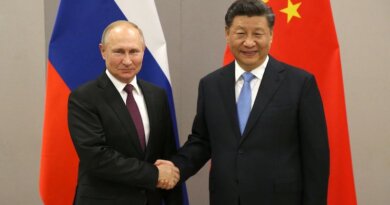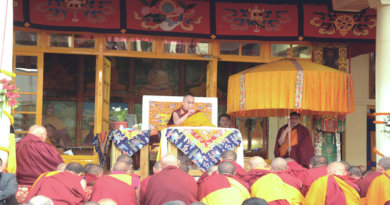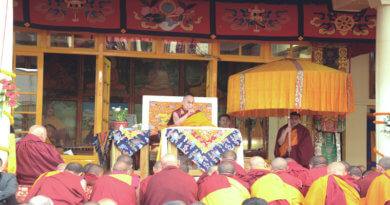The “Penpa Tsering Affair”, chronicle of a predicted shipwreck
Mathieu Vernerey | February 8, 2018
At the heart of the “Penpa Tsering Affair”, the supporters of the one who presents himself today as “victim” denounce “injustice” and want to believe in the opportunity of a “democratic protest”. But what looms on the horizon is the pitfall of division and confrontation among exiled Tibetans, against a backdrop of rivalry between two former political allies. Penpa Tsering’s supporters still refuse to see his own role in setting up the institutional censorship he now faces.
For several months and especially in recent weeks, some people have resolved to take sides in the case between former Speaker of the Tibetan Parliament in exile Penpa Tsering and President Lobsang Sangay. These same people wish today to present Penpa Tsering, who has been dismissed from his position of representative in Washington, as a victim of the policy of censorship led by Lobsang Sangay and the reactions of indignation resulting from it as the precursor sign of a democratic protest.
This is obviously their right and their reading of the affair belongs to them, but my reading is not the same.
For my part, I consider that this case consists of an internal settling of scores within the Tibetan administration, with the pretext of a dispute related to the function recently exercised by Penpa Tsering under the direct authority of Lobsang Sangay. Let it be said differently: Penpa Tsering is paying the price of his rivalry with Lobsang Sangay in the last election of 2016 and the price of his betrayal since they both previously headed the Tibetan administration and were equally responsible for the censorship policy they initiated together and which has continued ever since.
It is still necessary to specify what this censorship policy consists of.
Between 2013 and 2016, Penpa Tsering at the head of Parliament and Lobsang Sangay at the head of the government worked together to smother and crush any opponents of the official line. With a certain and undeniable result. During these three years, they constantly accused these same opponents of being “disloyal” towards the Dalai Lama and “betraying” him – accusations with the devastating resonance within the Tibetan diaspora. In particular, they accused them of “harming the longevity of the Dalai Lama”, relying for that on an incredible resolution adopted by the Parliament requesting the Dalai Lama “to live up to the age of 113 and beyond”. Penpa Tsering, in particular, sought to disqualify the MP Karma Choephel, himself former Speaker of Parliament, because he had dared to dissociate himself publicly from the official line. In particular, Penpa Tsering orchestrated the self-criticism session inflicted to Karma Choephel within the parliament, forcing him to abjure charges he had never brought against the Dalai Lama. Penpa Tsering and Lobsang Sangay continued their joint action of intimidation by putting pressure on the last opposition groups to resign their political vocation or to declare that they no longer oppose the action of the government. Finally, in the last elections in 2016, they issued a new electoral law to especially prevent Lukar Jam, the only true opposition candidate, from receiving any political and financial support with the aim to disadvantage him in the electoral process.
That’s what a censorship policy is.
When I now have to appreciate the divorce of this political couple that has literally institutionalized censorship and created a deleterious climate within the exiled community, I do not say that the “Penpa Tsering Affair” reveals an injustice in which one would be a victim and the other would be guilty. On the contrary, I think that there is finally a form of justice that consists of a providential backlash for both of them who have inflicted authoritarian governance on their opponents and now find themselves confronted with their turn by force of things.
Among those who are upset today about the “injustice” supposedly suffered by one or practiced by the other, we find mainly the supporters of the one who is presented as “victim”. As for the real political opponents, the very ones who have actually experienced the injustice under the previous mandate of Penpa Tsering and Lobsang Sangay, they carefully stay at distance and are right in that.
For there would be nothing more dangerous than to want to turn a partisan dispute into a supposed democratic prelude, especially if none of the parties questions the origin of the political practices that are now being denounced. For example, it would be unthinkable for me to defend Penpa Tsering without recalling his responsibility or accusing only Lobsang Sangay without questioning Penpa Tsering.
As we know, the political climate in exile has deteriorated since the resignation of the Dalai Lama in 2011, and the way things go, it will only degenerate into infighting after his death. This has already begun: the “Penpa Tsering Affair” is a sad illustration of this, and it is not, as it stands, the harbinger of a democratic wind.
That is why the supporters of Penpa Tsering, including others who have been persuaded or are intimately convinced of an “injustice”, should think about the grounding of their postulate before wanting to lead more people in the risky adventure of division and confrontation. This does not mean to keep silent about the autocratic attitude of Lobsang Sangay, quite the opposite.
On the other hand, finally authorizing the debate about political objectives, infusing the Parliament with the pluralism that it lacks, allowing the expression of the opponents as well as allowing the conditions of political alternation – in short, the opposite of all that Penpa Tsering and Lobsang Sangay have done so far – this would serve not only to avoid the worst but also to concretely embody the democratic dynamics that each one scrutinizes the first signs with legitimate anxiety on the horizon.
This article was originally published in French and developed in the context of the French Tibetan movement: L’affaire “Penpa Tsering”, chronique d’un naufrage annoncé
Mathieu Vernerey is the former editor of the French-review Alternative tibétaine (Tibetan Alternative) and participates in the Rangzen Alliance. As a journalist, he also works with the review Le Monde diplomatique and the magazine Diplomatie.



